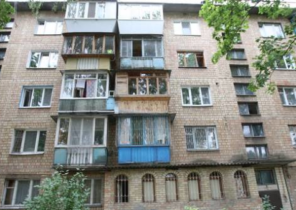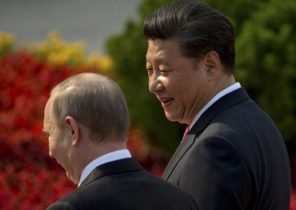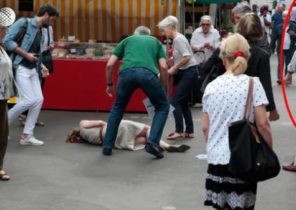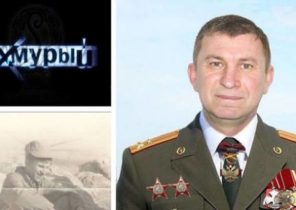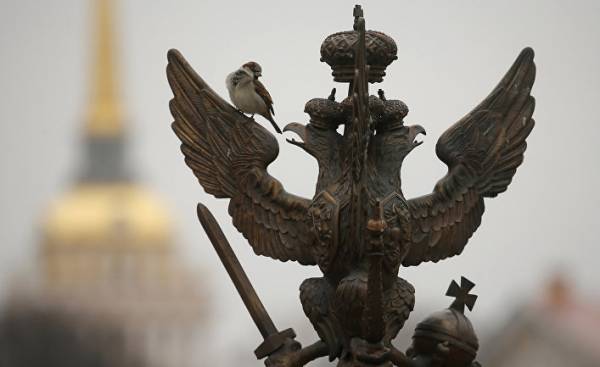
Many States today would like to have a “soft power”. The United States, despite their bright President, is still the number one use of soft power, Germany, no doubt, also adhere to this strategy. “Soft power” today are in demand and becoming more and more political appeal — even for such autocratic powers like Russia and China. We have in the West is not yet as strongly felt. However, for this development with good reason.
What is soft power? Great cultural nation like China (Confucius Institute), France (Alliance Francaise) and the UK (example of democracy) claim that the main function of soft power embodied in their own historical development. The most concise definition of the term soft power is: “The ability to attract” — the ability to attract. In other words, the political use of force, based on cultural impact and credible proposals for interstate cooperation. Thus, the key feature of soft power is the exercise of power by influencing the goals of political actors without the use of (economic) incentives or (military) threats.
The potential of such “soft power” is great. Influential large and medium-sized powers, meanwhile, are concerned about whether their own country is sufficient “soft power”. China’s President Hu Jintao in 2007 declared the Communist party that China must increase its soft power. The President of Russia Vladimir Putin in the summer of 2013 also demanded that diplomats often use soft power. By the fall of 2013, the Russian Ministry of foreign Affairs should develop an appropriate concept. But after the occupation of Crimea and military aggression in Eastern Ukraine in early 2014, the question of soft power and Russia was closed.
In France and the UK also have long discussed the notion of soft power. In the United States the concept of “soft” (“soft”) are willing to replace with “smart” (“smart”) — but the principles remain the same. Soft power is a power of persuasion and attraction, but above all, credibility, believability and, in some cases, also the ritual of the country. Spectrum is quite wide, it extends from the forces of attraction of the “American Way of Life” (“American life”) to such Western values as democracy and human rights. A classic example of America’s soft power is considered to be the “Marshall plan”, which after the war received benefit even former enemies.
Engineering, world, rule of law
Soft power can be implemented in completely different ways: through exemplary government leadership, through reliable authoritative foreign policy or through special brilliant achievements in various social spheres such as culture, science and sport. The German soft power consists primarily of the legal public order, able to cooperate foreign policy, but also from literary and musical heritage of the great classics, from the innovative engineering and impressive world Cup, or the strength of the urban attractiveness of the capital of Berlin. Thus, a civilized society takes important signals in the evaluation of “soft power” of the nation. High financial contribution to development cooperation and humanitarian assistance around the world — also factors of German soft power, the value of which cannot be underestimated.
The power of attraction of such combinations is large. In 2013 in the annual report “Soft Power Survey” Germany was chosen as a “soft force” number one in 30 countries, she was ahead of England, the United States, France, Japan, Sweden, Australia, Switzerland, Canada and Italy. Of the 50 reporting indicators for this conclusion was estimated, among other things, the standards of work of the government, diplomatic structures, cultural potential, resources, system of education and attractiveness for foreign investors. Also in the evaluation of soft power have the value of cultural events, the Olympic medals (!), the attractiveness of the national architecture or enjoying the worldwide success of industrial products.
In the ranking of “Soft Power 30 Ranking 2016” Germany was in third place after the United States and great Britain. Russia took 27th place, China — 28th. The current rating of “Soft Power 30, Ranking 2017” introduced in the first place France, which among other things is connected with the dynamism of the President of Macron. “We see that global engagement and influence of France grow.” The following took place United Kingdom, United States, Germany and Canada.
Should not be surprising that in the ranking of soft power appears and Russia: Moscow has long realized the importance of “soft power”. But its implementation is evaluated very critically by many experts. “After the collapse of communism, Russia has failed to become attractive to neighbouring countries,” wrote Jaroslav Tsvek-Karpovich (Jaroslaw Cwiek-Karpowicz) in July 2012, in his article “the Failure of Russian soft power” for the German society for foreign policy. And then continued: “Her social and political development does not seem attractive. In addition, she continues to communicate with its neighbors Imperial gestures. Obviously, Moscow is wrongly understood soft power as a tool to manipulate public opinion in targeted countries. Lack of activity of Russia in regard to the application of soft power, is aggravated by its neo-imperialist attitude to the neighboring countries. Moscow is not able to offer them attractive prospects of integration, without resorting to old patterns of domination and dependence.”
No appeal without success in domestic policy
It is also impossible to reject the appeal, without reaching success in its domestic political problems, he wrote further Tsvek-Karpovich. “But in Russia there remain large problems with corruption, human rights violations, lack of democracy and weak state of law. Therefore, its political and socio-economic transformation is not suitable as a model for other post-Soviet States”.
Even more clearly expressed by the American Professor and political scientist Joseph Nye (Joseph Nye) in December 2014 in a televised debate: “In global competition are not only economic and military power, but also the attractiveness and charisma, he said. — America has this soft power, Russia — no.” Nye believes that soft power of Russia is declining — with potentially disastrous consequences. “Russia’s problem is that she has very little soft power that it could use”.
Russian analysts and politicians have long realized the critical development factors. At the time, they led to the collapse of world powers of the Soviet Union during the Gorbachev era. Exception: Carnegie Moscow center looks even on the last days of the Imperial power. “The last days of the Romanovs brought a somber lessons. If comprehensive reform is not enough political will, then, as happened to the tsarist regime 100 years ago, the acute foreign policy crisis can lead not only to the collapse of the system, but also the whole country.” There is probably only one promising opportunity for Russia to become a real “soft power” and thereby become sustainable and stable “hard power”. She is to controlled by Vladimir Putin, the government began to this domestic reform aimed at liberalizing the economy and democratizing the political system.
Only the soft power of Germany is not enough
Since 2007, there are political comments of experts in relation to Germany, such as Peter Wittig (Peter Wittig), the German Ambassador in Washington (“the Role and understanding of soft power in German foreign policy”) and by Volker pertes (Volker Perthes), Director of the Foundation science and politics (SWP) (“Soft power as a foreign policy”). So, Perthes warns against exaggerated expectations when using soft power: “the Combination of soft power with other instruments of power (e.g., economic aid and military means of pressure) is described by the Hiring of Joseph as a “smart power”… Crucial that when referring to soft power it is often a question about the ideal values has an honesty policy: the gap between discourse and practical politics was not too great…
As a warning against too idealistic interpretation of soft power, it should be said that soft power can lead to the expectation of expanded use of violent means of pressure. In Germany and Europe definitely increased the expectation of increasing costs of material resources and, in certain circumstances, in times of crisis and conflict, not only political and economic intervention, but also military. Thus, the development of soft power does not relieve us from the hard conflicts of the world.” (Pertes)
Former foreign Minister Joschka Fischer recently aptly said edition of the FAZ.: “Soft power, will effect only when you have and hard, then people take it seriously”.
The political debate about Germany’s role in full of conflicts and challenging the world order still suggests that many local politicians are obviously not aware of the relationship (immutable) geopolitical obligations on the one hand, and of course the German (and European) interests on the other. The question is whether they want and whether they can develop a new ideological background the balanced foreign and security policy for the good of Germany and in favor of the stability of the European world order. Stringent requirements of the President of trump to the European NATO partners to contribute 2% of their gross domestic product to Finance the Atlantic defense Treaty, was to lead to serious reflection, to avoid a scandal with the leading power of America and other partners. Trump forever will be, and the two percent fee is for sure.
This important requirement, not least due to our participation in the only effective Union in this world, deserves more of rationalism and logic, than the awkward attempts of the German foreign politicians to behave as an ethical peacekeepers without any connection with the real world order.
Requirement 2% could be filled with life
What would happen to this proposal if the government has constructively solved the issue 2%? A conditional offer could look like: from 2% of GDP 55% would be used for defense spending. Not to arms, but only to recovery within eight to ten years lost 25 years ago the combat readiness of the armed forces. 10% would go to development cooperation, the goal should be economic cooperation with Africa. Additional 10% provided for costs of arriving refugees. 10% — in humanitarian support to assist the refugees of the war, such as in Turkey or the Sudan.
5% will be used to support the Federal States for implementation of agreed actions, both civil and military — and, if necessary, also in return do not pay now United States contributions to international organizations. 10% will remain in reserve for as yet unknown purposes. On the basis of such a conditional clause could be shared reinforcing the trust arguments within the Union and with the United States.
What instead happened in the summer of 2016? Three of the leading policy of the rich traditions of the people’s party SPD (SPD) in the past months, opened the card, however, in a completely unexpected direction: own accused the NATO Alliance in the “loud saber rattling and war cries” against Russia. Rude remarks against the Minister for foreign Affairs of trump Tillerson Rex (Rex Tillerson) rejected delivery of the aircraft carriers, and raised the fear of neighboring States before a well-armed Germany.
Ignorance in the geopolitical development
These, at least, simplistic objections can detect not only the ignorance in the sphere of geopolitical development. They also have a negative impact on the production of German soft power, completely ignoring other areas of foreign and domestic policy because of the refusal of the reliability and rationality in the security policy. And they show that such an important party like the SPD in the field of security policy no longer provides the right words of experienced consultants with a common sense approach is all about conflict events in the world. Only one thing matters: how to get the votes of his core constituency.
Far-sighted political parties as opinion-forming elite, very soon will have to clarify for themselves whether the strategy of “effective soft power” junk. As Germany will be able to actively take on the stabilizing role of soft power, which is the confidence of the neighbors and the world, but at the same time seriously and is promising to cope with future crises? “I will be talking about how to find the (military) budget, which will be able to perform two tasks: an effective deterrent and the ability to cooperate. It may cost more than 2% per year.
Unfortunately. But safety is too important to exhibit negligence… Effective deterrence is a good weapon and good, that is peaceful, position. Germany must trust… the Germans are tied in alliances with the US and France. Both countries are responsible for the security of Germany. Therefore, it may be appropriate to assist them in their wars… it’s a selfish altruism. And in such cases Germany must be armed to participate in foreign operations…
The second part of the double solution should be: Europe will be to prevent by force, to deal with crises around the world, to advise, to assist, to invest. While it is about water, climate, poverty, oppression. This is some of the causes of wars around the world. Europe must take care of yourself. Because problems do not remain where they arise, they come to us, as we now learned of the Germans after the start of the refugee crisis”. Can only agree with the editor of Spiegel by Dirk Kurbjuweit (Dirk Kurbjuweit): “All this requires at least as much attention as military security. Weapons and prevention together could transform the European Union into a real global power”.
If — still — successful middle power Germany would be able to come to a conscious acceptance of the role of “effective soft power” and would share the ability to its use in politics and the world order with the maximum number of European partners from the EU there would be a new attractive target: become a world power, the European soft power. The foundations have been laid.
The wolf Bullet is a professional soldier, an officer of the Bundeswehr. For two years as a NATO officer was engaged in planning at the headquarters of the then group of armies “Center”, Heidelberg. Now Poole is the Executive Director of the International consulting company, which advises governments in politically unstable developing countries.
